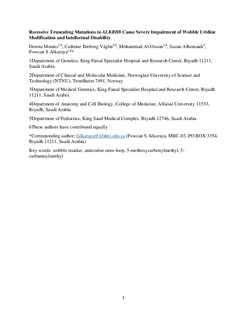Recessive Truncating Mutations in ALKBH8 Cause Intellectual Disability and Severe Impairment of Wobble Uridine Modification
Journal article, Peer reviewed
Accepted version

Åpne
Permanent lenke
http://hdl.handle.net/11250/2617090Utgivelsesdato
2019Metadata
Vis full innførselSamlinger
Originalversjon
American Journal of Human Genetics. 2019, 104 (6), 1202-1209. 10.1016/j.ajhg.2019.03.026Sammendrag
The wobble hypothesis was proposed to explain the presence of fewer tRNAs than possible codons. The wobble nucleoside position in the anticodon stem-loop undergoes a number of modifications that help maintain the efficiency and fidelity of translation. AlkB homolog 8 (ALKBH8) is an atypical member of the highly conserved AlkB family of dioxygenases and is involved in the formation of mcm5s2U, (S)-mchm5U, (R)-mchm5U, mcm5U, and mcm5Um at the anticodon wobble uridines of specific tRNAs. In two multiplex consanguineous families, we identified two homozygous truncating ALKBH8 mutations causing intellectual disability. Analysis of tRNA derived from affected individuals showed the complete absence of these modifications, consistent with the presumptive loss of function of the variants. Our results highlight the sensitivity of the brain to impaired wobble modification and expand the list of intellectual-disability syndromes caused by mutations in genes related to tRNA modification.
